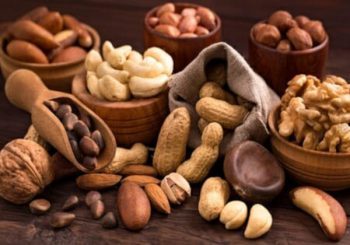Guest Writer for Wake Up World
For thousands of years, nuts have been known for their versatility, flavor, texture, and most of all their health benefits. But did you know that the nut has a long history?
An archaeological excavation in Israel turned up the remnants of several different types of nuts thought to have been consumed by man around 780,000 years ago! And here’s the cool part, along with the remnants they also found different types of nutcrackers! All around the world evidence of nuts are typically found near ancient human artifacts.
Today we still love nuts but as a result of the modernization of food (i.e. processing), they have fallen from the health radar, generally speaking. However, those in the holistic community still hold the nut in high regards, and fortunately, now science is confirming the benefits of including nuts in a healthy diet.
Unfortunately, a dark shadow has been cast upon nuts in the form of food allergies, which have been on a significant rise over the last few decades. This discussion will focus specifically on nut allergies and nut induced asthma.
The World Allergy Organization states that the incidence of allergies and asthma has risen more than 50% over the last 40 years. Once thought of as rare, the prevalence of food allergies is evident everywhere.
So why the dramatic increase? Could it be genetic?

Scientists agree that the increase in food allergies has occurred too fast to be blamed on genes.
Some theorize that our environment has become so sterile that our immune systems are no longer able to develop antibodies. A recent study found that eating peanuts at an early age could actually prevent the allergy, suggesting that this theory is a credible one.
Another study found a link between Vitamin D deficiency and the onslaught of food allergies, but this should come as no surprise. In today’s society, adults and especially kids spend less time playing outdoors and more time indoors glued to computers, smartphones, tablets and video games. And when we do go outside, we are usually lathered with sunscreen that prevents this vital nutrient from being absorbed into the skin. (Interesting article about Sun and Skin Cancer)
Interestingly the peanut, though technically not a nut but rather a legume, has triggered much debate over whether schools should be “Nut Free Zones” so as to prevent potential contamination in the air from peanut dust. Though I would find that concern more viable if it were suggesting that the contamination was from aflatoxin and not from peanut dust itself. Aflatoxin a toxic compound produced by certain fungi that have been known to grow on all nuts and beans – including coffee beans. And it is these fungi that actually cause the allergic reactions that have been blamed on peanuts (and other nuts as well).
Aflatoxin contamination can be significantly lowered by:
- Avoiding raw nuts, legumes, and beans.
- Roasting the nuts, legumes, and beans.
- Taking at least 5000 mg of Vitamin C throughout the day.
With that said, of course if you believe you have a nut allergy, please refrain from consuming nuts or using personal care product containing nuts.
Let’s now look at some amazing health benefits offered by three popular nuts.
 Almonds
Almonds
- Reduces Risk for Coronary Heart Disease
A study published in Circulation found: “Almonds used as snacks in the diets of hyperlipidemic subjects significantly reduce coronary heart disease risk factors, probably in part because of the nonfat (protein and fiber) and monounsaturated fatty acid components of the nut.”
- Lowers Cholesterol and Inflammation
European Journal of Clinical Nutrition published a study that found that following a dietary portfolio that includes almonds not only lowers cholesterol levels but also C-reactive protein levels, a key marker of inflammation, and an independent risk factor for heart disease.
- Reduces Risk of Diabetes
Journal of the American College of Nutrition also published a study that found that: “An ADA diet consisting of 20% calories as almonds over a 16-week period is effective in improving markers of insulin sensitivity and yields clinically significant improvements in LDL-C in adults with prediabetes.”
Other than eating the almonds as is, another easy way to consume almonds is by drinking almond milk. Though there are excellent store brands, it is easy to make your own at home.
How to make almond milk:

Ingredients:
- 1 cup organic raw or blanched almonds
- 2 cups water
- ½ tsp. vanilla extract (optional)
Instructions:
- To reduce the level of aflatoxins, preheat your oven to 400 degrees and then roast the almonds for 8-10 minutes (or until the color gets a bit darker). Then let cool.
- Place almonds in a bowl, cover with water and soak for at least 8 hours (24 hours is preferable). The almonds will become soft and plump.
- Strain the water from the almonds and rinse them with cool water. Discard the soaking water.
- Place the almonds, water, and vanilla in a blender and blend on high speed for 2-3 minutes.
- Line a strainer with a nut milk bag or cheesecloth and strain the milk into a large measuring cup or bowl. Be sure to squeeze the nut milk bag or cheesecloth to extract all milk.
Then, enjoy your almond milk!
Milk can be stored in a closed container for up to two days in the refrigerator.
Walnuts
- Heart Healthy

Walnuts are high in antioxidants and healthy fats both of which have been found to combat risk factors associated with heart disease.
- Reduces Risk for Alzheimer’s
Walnuts are high in omega 3 fatty acids which have been shown to fight Alzheimer’s. A recent study suggests, “Dietary supplementation with walnuts may have a beneficial effect in reducing the risk, delaying the onset, or slowing the progression of, or preventing AD.”
- Induces sleep
Walnuts contain melatonin, a hormone that helps to regulate sleep patterns. A study published in 2005 concluded that “Melatonin is present in walnuts and, when eaten, increase blood melatonin concentrations.”
Other than aflatoxins there is another compound that I must mention because it has quite the spotlight shining on it all over the internet. And this is the issue of phytic acid. It has been said that this compound is an “anti-nutrient” because it can bind to minerals present in the body thus causing a mineral deficiency. However phytic acid is not only present in nuts, legumes, and grains, but in any food that grows from a seed. In other words, every plant consumed has phytic acid present, albeit in varying amounts.
Because this is somewhat complicated and an interesting topic, it will be discussed in greater detail during the Online Live Interactive Support Group.
In the meantime while we are on the topic of nuts, simply roasting, soaking or dehydrating nuts can reduce phytic acid levels and it also helps make the nuts easier to digest. Bottom line, as with any food, spice or herb, as long as you are eating nuts in moderation and in conjunction with a balanced nutrient dense diet this is not a big problem.
Macadamia Nut Oil – Amazing for the skin and body both inside and out!
- Improves cardiovascular health and Lowers LDL cholesterol
100 grams (~30 nuts) packs nearly 400 mg of potassium, a mineral known to help lower blood pressure. In fact, a recent study looked at different minerals and how they may affect blood pressure. Particular attention was paid to potassium, calcium, and magnesium. They found: “In conclusion, the present study points toward potassium, rather than magnesium or calcium, as the cause of lower blood pressures in populations and provides support for nutritional guidelines to increase dietary potassium to prevent hypertension.”

A 2008 follow-up study concluded that the “unique fatty acid profile” of macadamia nuts lowers LDL cholesterol in both men and women. “Epidemiologic studies and clinical trials have demonstrated that the unique fatty acid profile of (macadamia) nuts beneficially affects serum lipids/lipoproteins, reducing cardiovascular disease (CVD) risk.”
- Restores elasticity to the skin
Palmitoleic acid (omega-7) which is found in sea buckthorn and macadamia nuts has gained much popularity lately as a powerful tool in restoring elasticity to the skin. “In more recent years, elite Hollywood actresses have used Omega-7 fats to rejuvenate the skin and promote healing of dry, cracked skin. It’s a powerful source of nourishment for the skin’s collagen, strengthening existing skin and repairing injuries.”
- Reduces scars from injury, surgery or acne
A 2004 study concluded that the n-3 fatty acids (all found in high amounts in macadamia oil), are beneficial in healing damaged skin.
“…we showed that n-3 fatty acid induced a peak in nitric oxide at 3 hours post surgery and an intense deposition of extracellular matrix after 5 days of treatment. Thus, our results suggest a relevant role and potential therapeutic implication for fatty acids on skin wound healing.”
- Helps prevent sunburn by retaining moisture in the skin
Macadamia nuts contain cinnamic acid, a natural plant chemical known for its sun protection properties. This chemical is found in many nut and seed oils and provides a variable SPF level of 6-8!
So I don’t know about you, but I think it’s time to get a little nutty over nuts!
Originally published at onlineholistichealth.com and reproduced here with permission.
Recommended articles by Dr. Michelle Kmiec:
- Have You Ever Asked Yourself, “How Did I Get To Where I am In Life?”
- Change How You Perceive Yourself and Love Who You Are
- Ready to Make Life Changes But Don’t Know Where to Begin?
- Could Glutathione Be the Key to Slowing the Physical Aging Process?
- Serrapeptase: an Enzyme That Treats Inflammation, Arthritis, Scar Tissue and More
- The Truth About Insomnia, Depression and Anxiety
- Natural Cure for Depression Silenced?
- The Link Between Stress and Intestinal Parasites – and What to Do About Them
- The Sun and Skin Cancer: the Truths, Pseudo-Truths and Lies of Mainstream Science
- A Natural Cure for Migraines
About the author:
 Dr. Michelle Kmiec is a board-certified chiropractic physician who also holds a Bachelor of Science degree in Human Biology, and a minor in Medical Research. She is a life-long athlete who after curing herself 100% naturally from MS and chronic anxiety, became an avid nutrition health researcher/promoter.
Dr. Michelle Kmiec is a board-certified chiropractic physician who also holds a Bachelor of Science degree in Human Biology, and a minor in Medical Research. She is a life-long athlete who after curing herself 100% naturally from MS and chronic anxiety, became an avid nutrition health researcher/promoter.
She has been featured in many Health magazines and has been a guest on radio talk shows in the USA, Canada, United Kingdom, and Australia. She is the author of the book “Healthcare Freedom Revolution: Exposing the Lies, Deceit and Greed of the Medical Profession”, Founder of Online Holistic Health, and a contributing writer for other popular informative health website/blogs. She is also co-founder of Crazy Meets Common Sense! – the Podcast that makes sense out of the crazy, to help you live a more healthy, fulfilling and empowering life!
For more, visit OnlineHolisticHealth.com or connect with Dr. Michelle Kmiec on Facebook, Twitter and LinkedIn.

If you've found value in our articles, we invite you to support the release of our brand-new book, "Gratitude Practices for Kids: A Practical Guide for Adults to Instill a Spirit of Appreciation and Positivity in the Next Generation."
"Gratitude Practices for Kids" brings together over 25 innovative and accessible practices designed to enhance gratitude in everyday life. This comprehensive guide is backed by 17 scientific studies, ensuring each concept is grounded in research, underscoring our commitment to nurturing growth, emotional intelligence, and positive interactions between adults and children.
We encourage you to opt for the paperback version to celebrate this new release. Dive into its fresh pages away from digital distractions, allowing you to immerse yourself in the transformative practices it offers.
Over recent years, Wake Up World has faced significant online censorship, which has impacted our financial ability to operate. Moving into book publishing represents a strategic step to secure the ongoing funds needed to continue our mission. By purchasing Gratitude for Kids, you help us keep our content free and accessible to everyone, avoiding needing a paywall. With over 8,500 articles published in the last 13 years, we remain dedicated to keeping our valuable content open to all.








